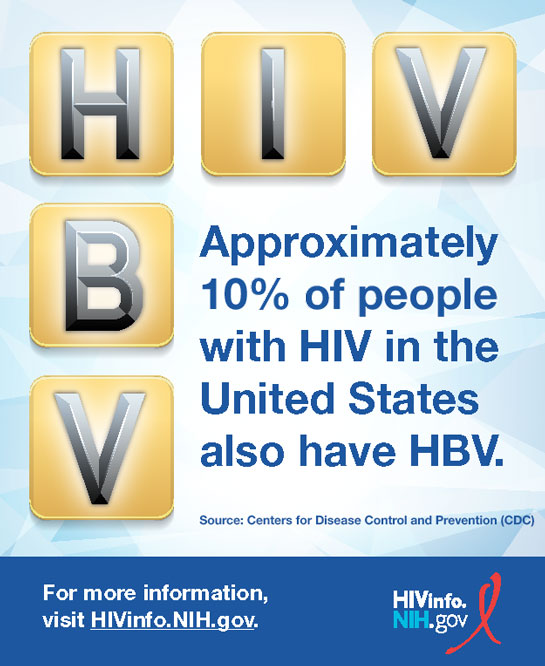HIV and Hepatitis B
Key Points
- According to the Centers for Disease Control and Prevention (CDC), approximately 10% of people with HIV in the United States also have hepatitis B, a liver infection caused by the hepatitis B virus (HBV).
- HBV is spread through contact with the blood, semen, or other body fluid of a person who has HBV. Among adults in the United States, HBV is spread mainly through sexual contact.
- People with HIV/HBV coinfection should be treated for both infections.
What is hepatitis B?

Hepatitis B is a liver infection caused by the hepatitis B virus (HBV). The abbreviation HBV can stand for either the virus or the infection it causes.
HBV can be a short-term (acute) or a long-term (chronic) illness:
- Acute HBV occurs within 6 months after a person is exposed to HBV. In some people, acute HBV can lead to chronic HBV.
- Chronic HBV is a lifelong disease. Without treatment, chronic HBV can cause liver cancer or liver damage that leads to liver failure.
HBV is a contagious infection that can spread from person to person.
How does HBV spread from person to person?
HBV is spread through contact with blood, semen, or other body fluids from a person who has HBV. According to the World Health Organization, HBV is most commonly transmitted from mother to infant during birth (known as perinatal transmission). However, among adults in the United States, HBV is spread mainly through sexual contact.
HBV can also spread from person to person in the following ways:
- By sharing needles or other injection drug equipment (works) with someone who has HBV
- By sharing razors, toothbrushes, or similar personal items with someone who has HBV
- From contact with the blood or open sores of a person who has HBV
- From an accidental prick or cut from a needle or sharp object that is contaminated with HBV
What is the connection between HIV and HBV?
Both HIV and HBV spread from person to person in semen, blood, or other body fluids. For this reason, the main risk factors for HIV and HBV are the same: having sex without a condom and sharing injection drug needles or works.
According to the Centers for Disease Control and Prevention (CDC), approximately 10% of people with HIV in the United States also have HBV. Infection with both HIV and HBV is called HIV/HBV coinfection.
Chronic HBV more rapidly advances to cirrhosis (scarring of the liver), end-stage liver disease, and liver cancer in people with HIV/HBV coinfection than in people with only HBV infection. However, chronic HBV does not appear to cause HIV to advance faster in people with HIV/HBV coinfection.
Can HBV infection be prevented?
Yes. The best way to prevent HBV is to get the hepatitis B vaccine, which is estimated to reduce the risk of HBV by 80% to 100%.
CDC recommends that people with HIV and people who are at risk for HIV get the HBV vaccine (or the combined hepatitis A virus/HBV vaccine). The housemates and sexual partners of people with HBV should also get the HBV vaccine.
In addition, all people, including people with HIV, can take the following steps to reduce their risk of HBV infection:
- Use condoms during sex to reduce the risk of HBV infection and infection with other sexually transmitted infections, such as gonorrhea and syphilis.
- Do not inject drugs. If you do, do not share needles, syringes, or other drug injection equipment.
- Do not share toothbrushes, razors, or other personal items that may come in contact with another person's blood.
- If you get a tattoo or body piercing, make sure the instruments used are sterile.
Should people with HIV get tested for HBV?
CDC recommends that all people with HIV, regardless of age, get tested for HBV. Testing can detect HBV even when a person has no symptoms of the infection.
There are several HBV blood tests. Results of different tests show different things. For example, a positive hepatitis B surface antigen (HBsAg) test result shows that a person has acute or chronic HBV and can spread the virus to others.
To learn more about HBV tests, visit the CDC webpage Testing for Hepatitis B.
What are the symptoms of HBV infection?
Some people with acute HBV do not have symptoms. But some people can show signs soon after becoming infected. Symptoms of acute HBV can include the following:
- Loss of appetite
- Tiredness
- Nausea
- Vomiting
- Fever
- Abdominal pain
- Dark urine
- Clay-colored bowel movements
- Joint pain
- Jaundice (yellowing of the skin or the whites of the eyes)
Most people with chronic HBV do not have any symptoms and may not have symptoms for many years. Abnormal results on liver function tests may be the first sign of chronic HBV infection.
What is the treatment for HBV?
In general, HBV is treated with antiviral medicines. The medicines work to help limit damage to the liver.
People with HIV/HBV coinfection should be treated for both infections. Some HIV medicines (such as tenofovir alafenamide) are effective at treating both HIV and HBV.
The choice of medicines to treat HIV/HBV coinfection depends on the person. For example, some people may take HIV medicines that are also effective at treating HBV. Other people may take HIV medicines and an HBV antiviral medicine. If you have HIV/HBV coinfection, talk to your health care provider about the best medicines for you.
This fact sheet is based on information from the following sources:
From CDC:
From the HIV Clinical Practice Guidelines at Clinicalinfo.HIV.gov:
- Guidelines for the Prevention and Treatment of Opportunistic Infections in Adults and Adolescents With HIV:
- Guidelines for the Use of Antiretroviral Agents in Adults and Adolescents With HIV:
From the National Institute of Diabetes and Digestive and Kidney Diseases:
Also see the HIV Source collection of HIV links and resources.
